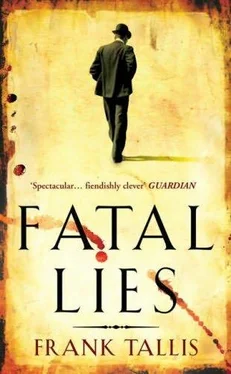Frank Tallis - Fatal Lies
Здесь есть возможность читать онлайн «Frank Tallis - Fatal Lies» весь текст электронной книги совершенно бесплатно (целиком полную версию без сокращений). В некоторых случаях можно слушать аудио, скачать через торрент в формате fb2 и присутствует краткое содержание. Жанр: Исторический детектив, на английском языке. Описание произведения, (предисловие) а так же отзывы посетителей доступны на портале библиотеки ЛибКат.
- Название:Fatal Lies
- Автор:
- Жанр:
- Год:неизвестен
- ISBN:нет данных
- Рейтинг книги:3 / 5. Голосов: 1
-
Избранное:Добавить в избранное
- Отзывы:
-
Ваша оценка:
- 60
- 1
- 2
- 3
- 4
- 5
Fatal Lies: краткое содержание, описание и аннотация
Предлагаем к чтению аннотацию, описание, краткое содержание или предисловие (зависит от того, что написал сам автор книги «Fatal Lies»). Если вы не нашли необходимую информацию о книге — напишите в комментариях, мы постараемся отыскать её.
Fatal Lies — читать онлайн бесплатно полную книгу (весь текст) целиком
Ниже представлен текст книги, разбитый по страницам. Система сохранения места последней прочитанной страницы, позволяет с удобством читать онлайн бесплатно книгу «Fatal Lies», без необходимости каждый раз заново искать на чём Вы остановились. Поставьте закладку, и сможете в любой момент перейти на страницу, на которой закончили чтение.
Интервал:
Закладка:
It was an extraordinary confession, but not unprecedented. Liebermann had known the professor to disclose personal details of his life before: his openness was not so remarkable, given that his masterpiece The Interpretation of Dreams contained much that would ordinarily be described as autobiographical-and not all of it flattering, by any means. Freud had included in the section on somatic sources an account of one of his own dreams, which he attributed ultimately to an apple-size boil that had risen at the base of his scrotum.
“Indeed,” Liebermann responded. “You are the most rational of men. So much so that I wonder whether the disturbed mental state that you describe might require a more compelling explanation than simply the human condition.”
“A more compelling explanation?” Freud repeated, a trail of pungent cigar smoke escaping from his mouth.
“Did these events take place when you were conducting your research into cocaine?”
“Why, yes…I used to take it as an antidepressant. To relieve my despair.”
“Isn't cocaine-taken in large doses-associated with insomnia, restlessness, nervous agitation?” Freud's pace slowed as he considered Liebermann's conjecture. He appeared quite self-absorbed, and again pulled at his beard. In a different register, Liebermann added casually: “Cocaine has never been used for headaches-has it?”
Freud started. “I beg your pardon?”
“Cocaine… has it ever been used for headaches?”
“No… no, not to my knowledge.” The professor seemed to gather himself together-although the lines that appeared on his forehead demonstrated that this was only accomplished with much effort. “I had always thought,” he continued, “that it might be useful primarily as a treatment for depression and anxiety. For a time, it was administered as a tonic for the German army: and a small amount of cocaine added to salicylate of soda is good for indigestion. But it has had strictly limited application in the sphere of pain relief. You know, perhaps, that Koller's discovery of cocaine as an anesthetic for use during eye surgery owed something to my original research?”
“No, I'm afraid I didn't.”
Freud pulled a face that suggested moderate pique-and then, recovering his natural mien, added: “Headaches? No. Never for headaches.”
54
The carriage had not yet reached the outskirts of Vienna.
“So,” said Liebermann. “It was Gartner who actually discovered Zelenka's body?”
“Yes,” Rheinhardt replied, consulting his notebook. “After which, he rushed upstairs to inform the headmaster-who had just begun a meeting with Becker.”
“And did anyone else enter the laboratory?”
Rheinhardt turned a page. “The old soldier, Albert, and two prefects: they were the ones who carried Zelenka's body to the infirmary.”
“I see,” said Liebermann, adjusting his necktie and quietly whistling a fragment of Bach.
Haussmann turned toward the window, concealing a half smile.
“You know, Max,” said Rheinhardt, “I really do wish you were more forthcoming! On our return I will be expected to justify this excursion, and if I am unable to, Commissioner Brugel will be particularly aggrieved. Two days ago he circulated a memorandum to all senior officers, requesting that we make every effort to remain close to the Schottenring station. He intimated that an unusual circumstance had arisen that might require our participation in a special operation at very short notice.”
“This ‘unusual circumstance,’ “ said Liebermann, “is it something to do with von Bulow's special assignment?”
Rheinhardt caught his assistant's eye.
“Oh, confound it, Haussmann, I'm going to tell him!” Rheinhardt leaned forward. “Young Haussmann here-”
“What are you whispering for?” Liebermann asked. The inspector pointed toward the carriage box. “Oh, don't be ridiculous, Oskar. The driver can't hear! He's outside!”
“I'm not taking any chances,” Rheinhardt replied, resting his elbows on his knees and leaning even closer. “Young Haussmann here was delivering some papers to the commissioner's office. He was about to knock, but held back when he heard raised voices. The commissioner was giving von Bulow-and yes, I did say von Bulow-a serious verbal drubbing. General von Stoger's name was mentioned… and there was talk of something having been stolen from his safe. A document that they called…” Rheinhardt's cheeks reddened.
“Studie U,” said Haussmann, gallantly coming to his superior's aid.
“Did you hear anything else?” asked Liebermann.
“Nothing of consequence,” Haussmann replied-but then added: “Well, there was one other thing. They kept on referring to the Liderc.”
“The Liderc. What does that mean?” Liebermann flashed a look at Rheinhardt.
“I really have no idea.”
“Liderc. Are you sure you heard that correctly?” Liebermann asked the assistant detective.
“Yes, Herr Doctor. It was definitely the Liderc,” said Haussmann.
“So,” Rheinhardt continued, “I strongly suspect that the commissioner is contemplating a large operation, the purpose of which will be to retrieve Studie U. As to the factors that will influence his de cision to proceed with the operation-or not-we can only specu late.”
“Interesting,” said Liebermann.
“Needless to say,” Rheinhardt added, “I am praying that the commissioner decides against briefing his senior detectives this afternoon.” Reminded once again of the matter in hand, the inspector leaned back and spoke now in his usual resonant baritone. “I've sent a telegram to the headmaster and I've made sure that Herr Sommer knows exactly what time we intend to arrive.”
“Herr Sommer?”
“Yes, Herr Sommer.”
“Why ever did you do that?”
“You said he was trying to avoid us… that he was a liar. I assumed-”
“He did try to avoid us, and he is a liar!”
“Then why don't you-”
“Want to speak to him?”
“Yes.”
“Because it isn't necessary: he's not as significant as I once thought.”
“Well, you might have said! What on earth made you change your mind?”
“Do you really want to know?”
“Of course I want to know.”
“Sugared almonds!”
Haussmann turned again to look out of the window, his half smile now widening to become an embarrassingly conspicuous grin.
On arriving at Saint Florian's, Rheinardt instructed his assistant to wait outside with the driver. He then ushered Liebermann through the stone arch and into the courtyard of the school. The old soldier, Albert, was seated on a bench, his chin buried in his chest. His stertorous breathing-amplified by the cloisters-sounded curiously mechanical: a repetitive grating and grinding. Rheinhardt approached and touched his shoulder, but did not shake him. The veteran's expression spoke too eloquently of blissful release from the heavy yoke of corporeality. Moved to pity Rheinhardt slowly withdrew his hand.
“I know how to get to Professor Eichmann s office,” he whispered. “We'll let this old fellow enjoy his beauty sleep, eh? You can question him later.”
Liebermann smiled, recognizing in Rheinhardt s small act of charity a justification for hope. Being a psychoanalyst, he saw the salvation of humanity not in great ideologies, religion, or political reforms but in everyday, barely perceptible deeds of kindness. He found this thought consoling, a counterbalance to his certain knowledge that they were about to find out how easily man becomes a thing of darkness-how easily civilized values blacken and curl in the heat of primitive passions.
Professor Eichmann greeted them with frigid condescension.
“You will forgive me, gentlemen, but I am extremely busy and cannot spare you much time.”
Читать дальшеИнтервал:
Закладка:
Похожие книги на «Fatal Lies»
Представляем Вашему вниманию похожие книги на «Fatal Lies» списком для выбора. Мы отобрали схожую по названию и смыслу литературу в надежде предоставить читателям больше вариантов отыскать новые, интересные, ещё непрочитанные произведения.
Обсуждение, отзывы о книге «Fatal Lies» и просто собственные мнения читателей. Оставьте ваши комментарии, напишите, что Вы думаете о произведении, его смысле или главных героях. Укажите что конкретно понравилось, а что нет, и почему Вы так считаете.












